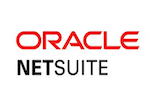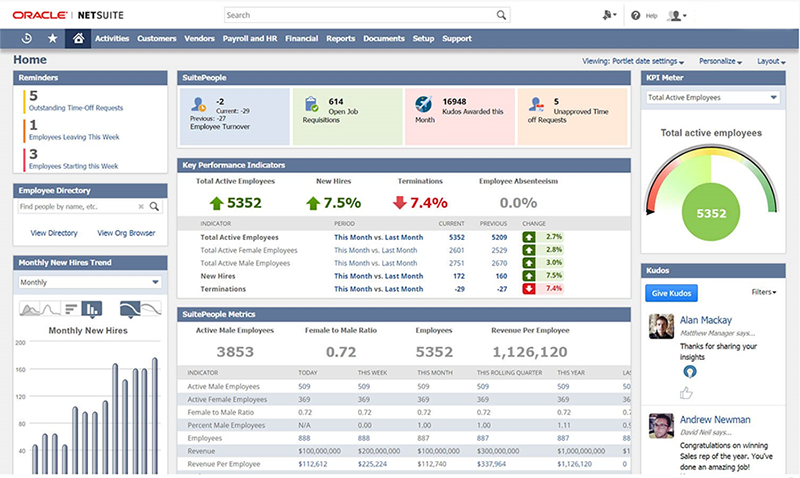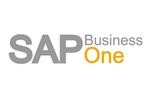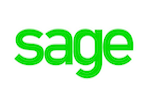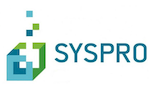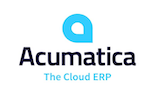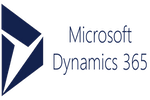Enterprise resource planning (ERP) software helps large organizations manage their entire operation within a single system.
With features like CRM, human resources, accounting, supply chain management, and more, a good ERP software is crucial to for everyday processes.
But today, with the deployment of cloud-based software and SaaS, ERP solutions can be used by businesses of all different shapes and sizes.
While the majority of ERP software is adopted by larger enterprises, SMEs and even some smaller businesses have begun using enterprise resource planning software over the last few years.
And it makes sense. ERP software is an all-in-one solution for any business.
The 6 Best ERP Software For Your Business
- Oracle Netsuite – Best Overall ERP Software
- SAP Business One – Best for Small Businesses
- Sage 300 – Best for Medium-Sized Businesses
- Syspro – Best for Manufacturers and Distributors
- Acumatica – Best ERP Software for SMEs
- Microsoft Dynamics 365 – Best for Bundle Licenses
After conducting extensive research, I’ve been able to narrow down the top six solutions in this category. Continue reading below for an in-depth review of each ERP software on our list.
#1 – Oracle Netsuite — Best Overall ERP Software
- Trusted by 20,000+ businesses
- Fully customizable
- Designed to support growth
- Perfect for any industry
Oracle Netsuite is our top recommendation for ERP software. They beat the competition in nearly every category.
More than 20,000 businesses across the globe trust this solution for enterprise resource planning—and for good reason.
Oracle Netsuite is fully customizable and designed to support growth. It’s easy to add functionality and resources as your business scales.
This cloud-based ERP can accommodate the needs of all different business types. Here are just a handful of industries that use Oracle Netsuite:
- Marketing and advertising
- Agriculture
- Government
- Professional services
- Restaurant and hospitality
- Construction
- Ecommerce
- Engineering
- Distribution
- Biotech and pharmaceuticals
The list goes on and on.
Bottom line: Oracle Netsuite accommodates your needs no matter what business you have.
Some of the top ERP features of this solution include order management, financial planning, financial management, and production management. The software can even accommodate supply chain management as well as warehouse and fulfillment needs.
You’ll be able to manage your end-to-end inventory and all of your logistics in real-time. The software helps maximize the efficiency of these processes.
Oracle Netsuite has built-in business intelligence. So you’ll be able to access visual analytics from all of your data. These reports allow you to make actionable business decisions.
Due to the customizability of this software, the pricing is not available online. This is common in the ERP software category. You’ll need to talk to the Oracle Netsuite sales team to discuss your needs and get a quote. Request a free product tour for more information.
#2 – SAP Business One — Best For Small Businesses
- Made for small businesses
- Mobile access
- 500+ add-ons
- Industry-specific solutions
Though ERP solutions have more often been use for bigger operations, many providers are starting to offer great solutions for small businesses.
SAP Business One is one such solution. If your company has outgrown your exiting tools or needs to consolidate your software to a single platform, SAP Business One has exactly what you’re looking for.
This software includes resources for sales, inventory management, CRM, financials, analytics, reporting, and more. It’s a great full-service solution.
SAP Business One offers industry-specific solutions as well. Choose from 500+ add-ons to customize your software based on your business type or industry needs.
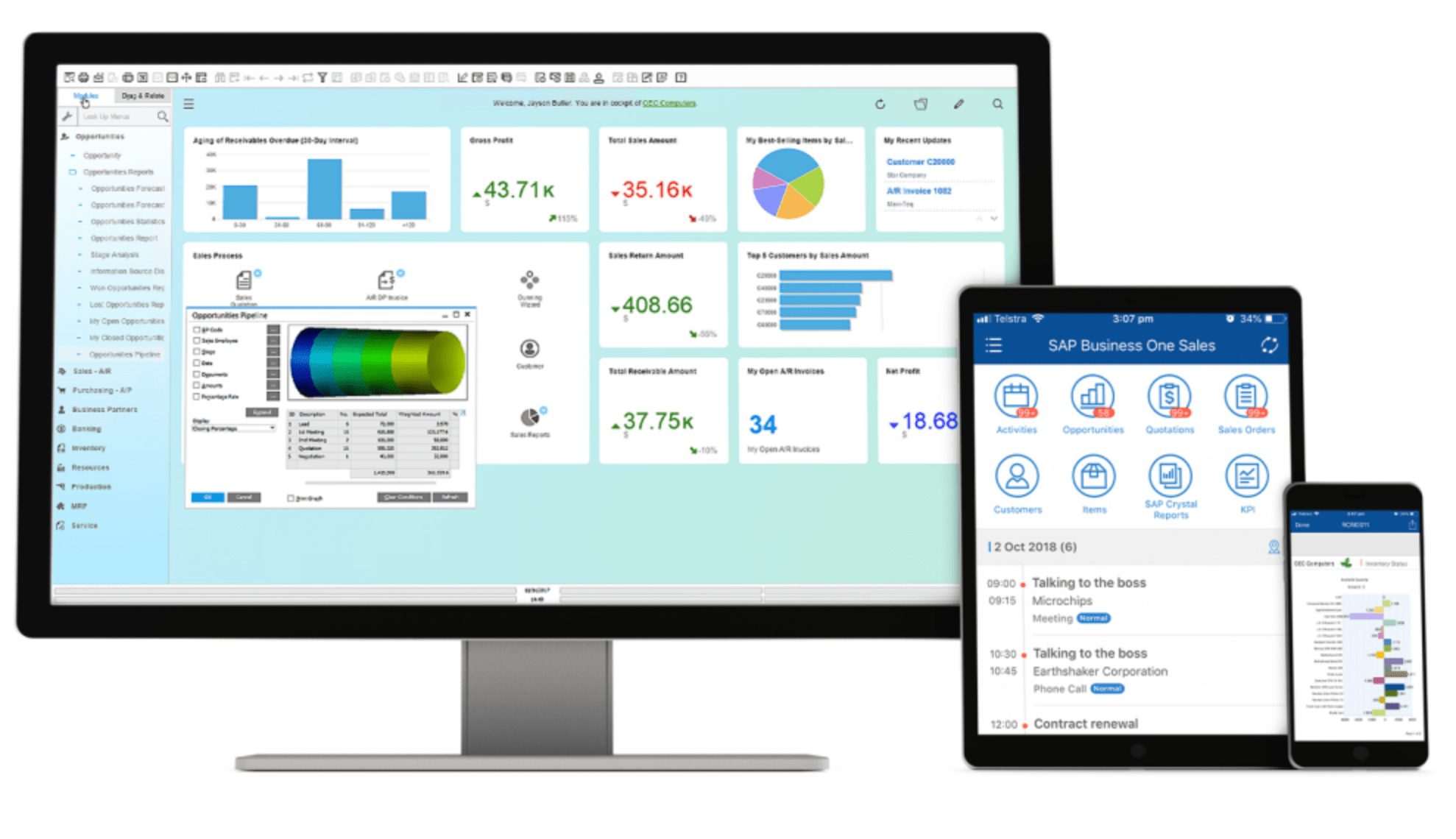
Another top benefit of SAP Business One is its intuitive mobile access. You and your team can access the software from anywhere using the iOS and Android mobile apps.
No matter where you are, you’ll always be able to check inventory, manage service tickets, and view real-time reports on the go. You can even set up alerts and complete approvals directly from your mobile device.
Like most ERP software, pricing for SAP Business One is not available online.
The initial setup is a bit of a hassle as well, which is the biggest drawback of this solution. After answering a somewhat extensive questionnaire, you’ll be contacted within 24 hours to discuss your company’s requirements in greater depth before getting an estimate. In many cases, you won’t be able to purchase the software directly from SAP; you’ll have to go through one of their partners or resellers.
At the end of the day, this is still a top choice for small businesses. Larger corporations might run into some limitations at scale.
#3 – Sage 300 — Best For Medium-Sized Businesses
- Cloud-based ERP software
- Great for international ecommerce
- Supports multiple currencies
- Automate vendor processes
Sage 300 is one of three different ERP software solutions offered by Sage. This solution is designed for mid-market companies.
From managing finances to operations and inventory, Sage 300 has it all. This cloud-based software is designed to help improve the total visibility of your company while maximizing ROI.
Sage 300 simplifies your financials. It’s a great choice for businesses that are managing multiple currencies. You can even use it for multiple businesses if you have subsidiary companies or franchises.
Getting Sage 300 for ERP means that you’ll also have access to a wide range of features in Sage’s extensive product suite. You’ll benefit from features like Sage CRM, Sage Inventory Advisor, and Sage Payment Solutions.
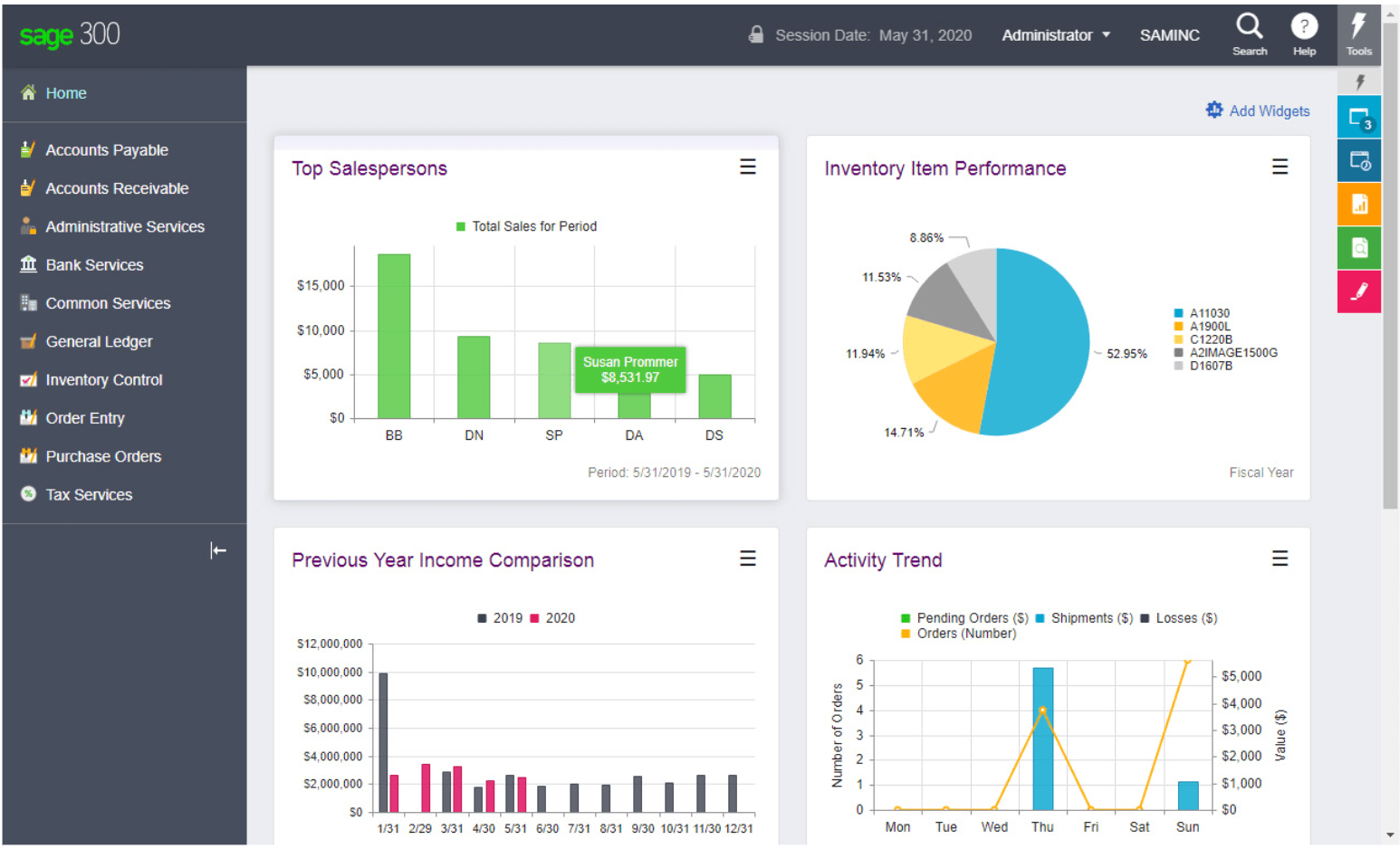
Sage 300 offers intelligent enterprise resource planning for international ecommerce operations. You’ll get real-time analytics as well as the ability to track and process orders from anywhere.
Another top feature of Sage 300 is the ability to manage vendor relationships. You can automate your purchasing process, orders, invoices, receipts, and returns. This will save you lots of time and resources whenever you’re ordering inventory or other materials.
If Sage 300 is too advanced and feature-rich for you, consider Sage 100 as an alternative. It’s still a good ERP software, but not made for international operations or multiple businesses. Sage 100 is more like an advanced accounting software with CRM and other ERP features.
For those of you who want more than the features available in Sage 300, you can upgrade to Sage Business Cloud X3. This is the top of the line ERP solution from Sage. It has a greater focus on supply chain management and sales, designed for larger enterprises.
While Sage Business Cloud X3 is great, it’s probably overkill for medium-sized businesses. But it’s nice knowing you can upgrade at a later time if your company grows.
The majority of you will benefit the most from Sage 300. Contact sales to request a free demo.
#4 – Syspro — Best For Manufacturers and Distributors
- Award winning ERP software
- Industry specific solutions
- 40+ years of experience
- Trusted by 15,000+ businesses
Syspro has ERP solutions for small businesses, mid-sized organizations, and enterprises. But with that said, Syspro is not for everyone. This ERP software is designed specifically for manufacturing and distribution.
With more than 40 years of experience in this industry, Syspro knows what it takes to have success in these spaces.
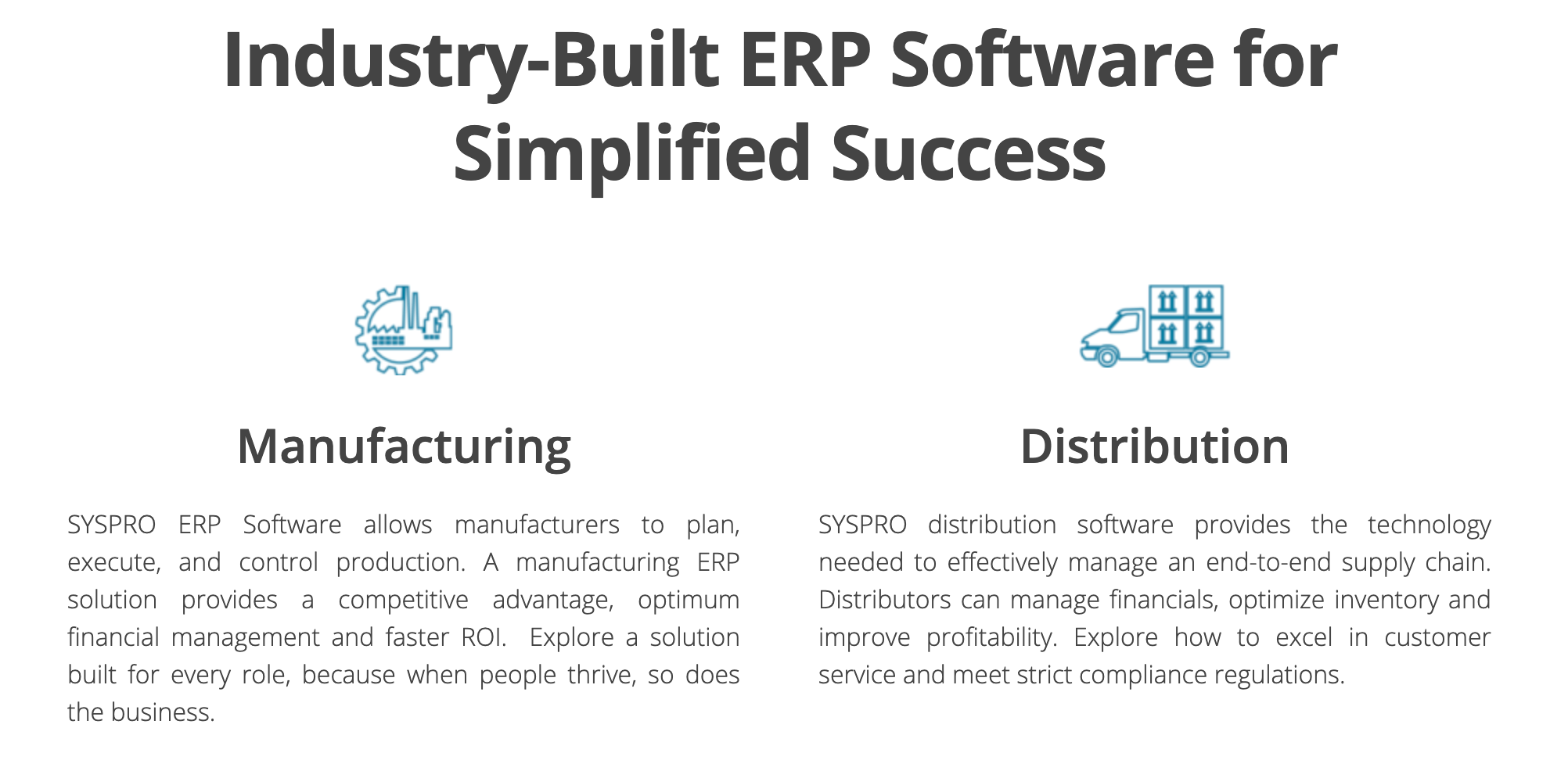
Syspro ERP is built with industry-specific functionality based on the business requirements for manufacturers and distributors. Common industries within these two categories using Syspro include:
- Auto parts and accessories
- Food and beverage
- Rubber and plastics
- Industrial equipment and machinery
- Packaging
- Fabricated metals
- Electronics
This award-winning ERP software is used by more than 15,000 businesses throughout 60+ countries.
Syspro ERP will improve your supply chain management and operational inefficiencies. You’ll benefit from actionable insights and reporting to make better business decisions.
In addition to customizing your software, Syspro will also let you fully customize your workspace based on roles and needs. So you and your team won’t feel overwhelmed or bombarded with irrelevant information or screens that you’re not using on a daily basis.
As your business grows, Syspro has the flexibility and power to scale with you.
If your company is involved with manufacturing or distribution, Syspro ERP will be your best option. Unfortunately, this software won’t support other business types. For example, if you’re in retail, professional services, or ecommerce, you’ll need to look elsewhere.
Contact Syspro to request a free demo.
#5 – Acumatica — Best ERP Software For SMEs
- Award winning ERP software
- Industry specific solutions
- Add users for free
- Supports growing businesses
Acumatica was founded in 2008, which makes this company newer compared to some of the other options on our list. Acumatica is small, but it’s growing rapidly. To date, they have 6,000+ customers and six offices across the globe.
I like Acumatica because they offer industry-specific ERP solutions. So no matter what type of business you have, you know that you’re not getting a cookie-cutter cutter software.
Here’s a quick list of the ERP software editions provided by Acumatica:
- General Business Edition
- Distribution Edition
- Manufacturing Edition
- Construction Edition
- Commerce Edition
- Field Service Edition
If you have a small to mid-sized enterprise in one of these categories, Acumatica will be a top choice for you to consider.

Acumatica ERP is extremely versatile. No matter what type of needs your business has, you can get an all-in-one solution from this service provider.
This award-winning cloud-based ERP software supports growth as well. You can easily add functionality and capabilities as your business scales. Acumatica also lets you add extra users without having to pay for additional licenses.
Acumatica has a free product tour available on its website. If you’re interested in learning more, you can request a custom demonstration and free demo with no obligation.
#6 – Microsoft Dynamics 365 — Best For Bundle Licenses
- Transparent pricing
- Discounts for additional licenses
- Apps for specific categories
- Flexible use cases
Like most Microsoft products, Microsoft Dynamics 365 is powerful, flexible, and trustworthy. It’s used by some of the world’s biggest companies, like HP, Coca Cola, Lowe’s, Delta, BMW, Adobe, UPS, and more.
But with that said, Microsoft Dynamics 365 is an ideal ERP solution for smaller businesses as well.
It’s a bit different compared to some of the other options on our list. Dynamics 365 is not really a single product. Microsoft offers multiple product bundles based on your needs. The categories include:
- Marketing
- Sales
- Customer Service
- Operations
- Field Service
- Finance
- Commerce
- Human Resources
Each one comes with different apps as a product suite. For example, Operations comes with apps for supply chain management, project service automation, and business central.
Unlike other ERP solutions, Microsoft is fully transparent about its prices and lists all of the prices on their website. It’s a little complicated since each category has multiple prices and individual prices for each app within that category. You’ll get discounted rates if you already have qualifying Dynamics 365 apps.
For example, here’s a look at the Microsoft Dynamics 365 Field Service pricing, so you can see what I’m referring to.
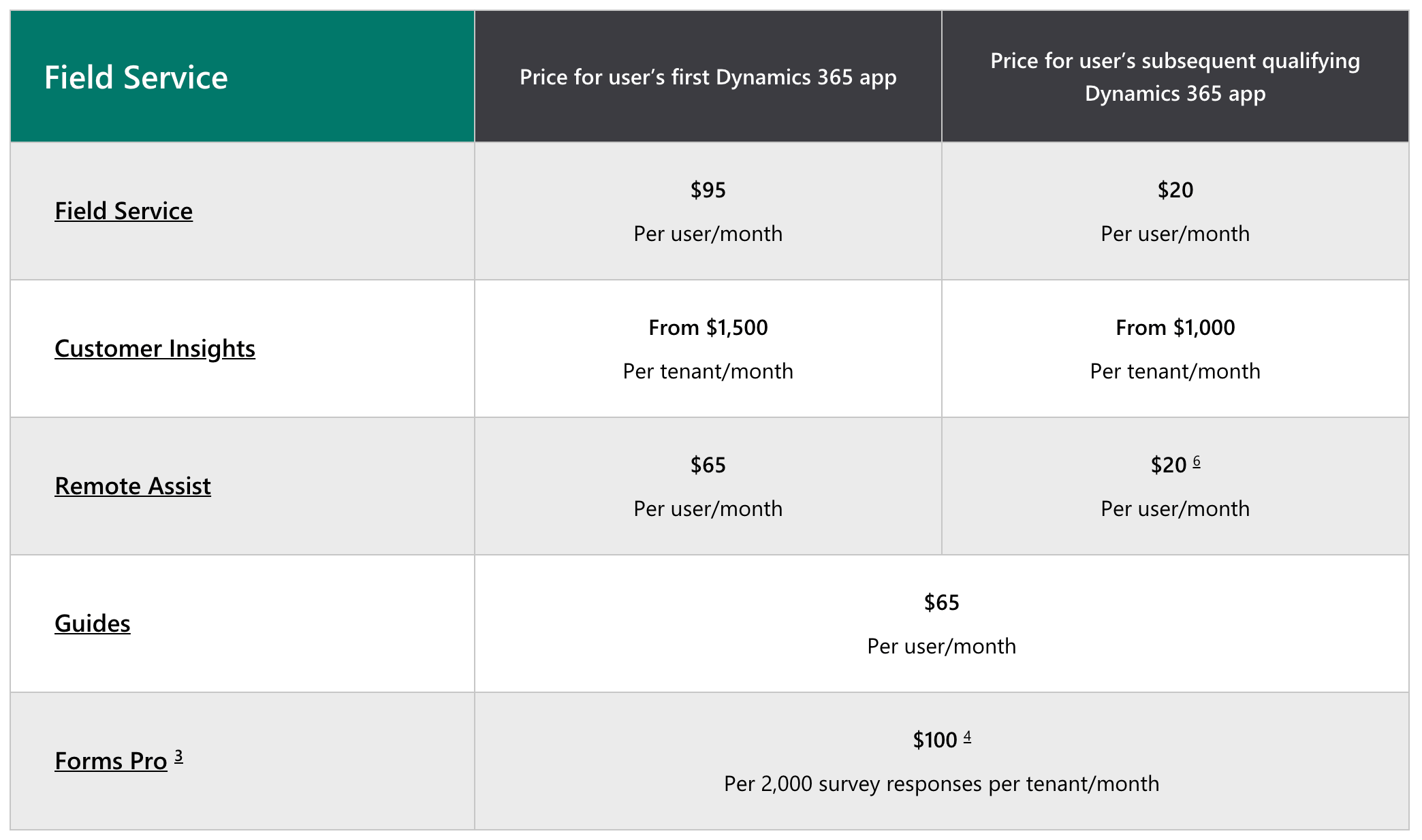
As you can see, there is a significant difference in pricing for your first Dynamics 365 app compared to subsequent apps.
With that said, there are some contingencies that you need to keep an eye on. Most packages require a minimum number of licenses to purchase, which is usually 10 or 20.
While the licensing guide and requirements are bit complex to navigate and understand, this option is the best solution for businesses that want to buy in bulk. You’ll also have the ability to pick and choose which specific products you’re looking for while benefiting from discounts on additional licenses.
For a limited time, get up to six months of Dynamics 365 for free.
How to Find the Best ERP Software For Your Business
With so many different ERP solutions on the market, how can you know which one is the best for your business?
I’ll explain the methodology that I used to pick the winners on our list. In most cases, there is no “best for everyone” ERP software. When you’re evaluating different software, you can determine what’s best for you based on the following factors:
Business Size
The size of your business will be the first way to narrow down your options. While the name “ERP” implies enterprise, not every solution is made for large enterprises.
For example, SAP Business One is designed specifically for small businesses. Sage 300 is a top choice for growing mid-market companies, and Acumatica is geared toward SMEs.
So if you have a large-scale enterprise, you wouldn’t consider any of those options. You’d be better off with something like Oracle Netsuite or Microsoft Dynamics 365.
Industry
In addition to the size of your business, some ERP software is made for specific industries.
Syspro is a perfect example of this. It’s made for manufacturers and distributors; that’s it. You can even get a more specialized solution based on your industry within those two categories, like industrial equipment or electronics.
Sage 300 is a great option for international ecommerce businesses. Oracle Netsuite (our top overall recommendation) supports the widest range of business types and industries.
Features
The purpose of ERP software is to be an all-in-one solution for your business needs. But with that said, not all of the feature sets from software to software will be identical.
It’s important to understand what your company needs the most and target an ERP solution that offers those features out of the box.
Common ERP software features include sales tools, CRM, accounting tools, and human resources. But some of you might need features for things like supply chain management, operational management, and end-to-end inventory logistics.
Most ERP software is customized to meet your needs. So it’s easy for the service provider to add what you’re looking for—assuming they have those features to offer.
Setup
Nearly every ERP software requires you to get a custom quote before you get started. This adds an extra step to the setup process. You’ll likely want to get a quote and demo from multiple providers on your shortlist, just to see what options you have.
But once you decide on a solution, you want to make sure that the initial deployment is as easy as possible. Some software must be purchased from a third-party partner, which can be a pain. With that said, those partners usually do a better job of guiding you through the setup process.
Since most ERP software today is cloud-based, you won’t have to worry about installing anything locally on your servers, computers, or other devices. But that’s not the case with every option.
Conclusion
ERP software can simplify your operational efficiencies by providing an all-in-one resource for all of your business processes.
Oracle Netsuite is our top overall recommendation in this category.
But with that said, it’s not for everyone. Small businesses should lean toward SAP Business One. Mid-market companies and SMEs would be better off Sage 300 or Acumatica. Syspro is the best ERP software for manufacturing and distribution. For product bundles and discounts on bulk licenses, turn to Microsoft Dynamics 365.
Regardless of your business size, industry, or enterprise resource planning needs, you can find the best ERP software for your business using this guide.
Source: https://www.quicksprout.com/feed

